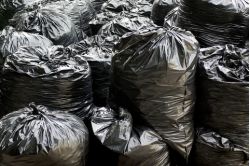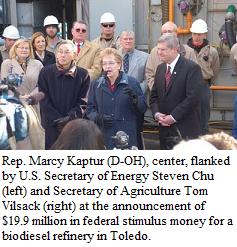VIPS traveling around Copenhagen during the Climate Conference are not only traveling in style, their limos are fueled with biofuel produced from straw. According to Novozymes, the largest enzyme producer in the world, this is the first time ever a fleet of limos has been fueled with this type of biofuel.
The advanced fuel is made from waste biomass, namely straw, by Inbicon, at its new USD-60 million gallon demonstration plant in Denmark. The fuel boasts an 85 percent reduction in CO2, as compared to cars running on gasoline. The reduction of CO2 is a hot topic during the conference.
Another hot topic is developing more effective enzymes to convert starch to sugar during the biofuel production process. Novozymes developed the enzyme that is being used in Inbicon’s ethanol production process.
The fleet of Volvo limousines is sponsored by Partnership for Biofuel, which is a cooperation between Inbicon, Statoil, Danisco, and Novozymes, as well as Volvo.



 “It’s a very non-traditional approach to utilizing some public lands that are not being utilized as well as they could be,” says Utah State University researcher Dallas Hanks. It is estimated that there are some 10 million available acres of land in roadsides, airports, military bases, railroad areas and more that currently require significant maintenance cost that could be used for producing biofuel crops such as safflower and canola which could be harvested a couple times a year. The benefits include a new source for biofuel feedstocks, as well as improved aesthetics and reduced roadside maintenance costs.
“It’s a very non-traditional approach to utilizing some public lands that are not being utilized as well as they could be,” says Utah State University researcher Dallas Hanks. It is estimated that there are some 10 million available acres of land in roadsides, airports, military bases, railroad areas and more that currently require significant maintenance cost that could be used for producing biofuel crops such as safflower and canola which could be harvested a couple times a year. The benefits include a new source for biofuel feedstocks, as well as improved aesthetics and reduced roadside maintenance costs. “We’ve been lucky enough to get a national coalition with an executive committee and land grant universities all around the country involved in this,” Hanks said during a recent interview at the
“We’ve been lucky enough to get a national coalition with an executive committee and land grant universities all around the country involved in this,” Hanks said during a recent interview at the 


 An Ohio biodiesel plant is among those
An Ohio biodiesel plant is among those  Big emitters of carbon dioxide are faced with a big problem. Industries and utilities will soon have to capture that CO2 and store it … somewhere. That’s where
Big emitters of carbon dioxide are faced with a big problem. Industries and utilities will soon have to capture that CO2 and store it … somewhere. That’s where  In this edition of the Domestic Fuel Cast, we talk to Carbon Sciences President and CEO Byron Elton, who explains how this process works. Basically, it’s the exact same process that changed carbon dioxide into hydrocarbons all those eons ago far beneath the surface of the Earth. But this is much more efficient and faster and could be the solution for those CO2 emitters looking for something to do with their newly sequestered product and a planet hungry for energy.
In this edition of the Domestic Fuel Cast, we talk to Carbon Sciences President and CEO Byron Elton, who explains how this process works. Basically, it’s the exact same process that changed carbon dioxide into hydrocarbons all those eons ago far beneath the surface of the Earth. But this is much more efficient and faster and could be the solution for those CO2 emitters looking for something to do with their newly sequestered product and a planet hungry for energy. According to a press release from the U.S. Department of Energy (DOE), DOE Secretary Steven Chu and Agriculture Secretary Tom Vilsack announced the selection of 19 integrated biorefinery projects to receive up to $564 million from the American Recovery and Reinvestment Act to accelerate the construction and operation of pilot, demonstration, and commercial scale facilities. Fifteen states will house these projects and help lay the foundation for full commercial-scale development of a biomass industry in the United States.
According to a press release from the U.S. Department of Energy (DOE), DOE Secretary Steven Chu and Agriculture Secretary Tom Vilsack announced the selection of 19 integrated biorefinery projects to receive up to $564 million from the American Recovery and Reinvestment Act to accelerate the construction and operation of pilot, demonstration, and commercial scale facilities. Fifteen states will house these projects and help lay the foundation for full commercial-scale development of a biomass industry in the United States. 